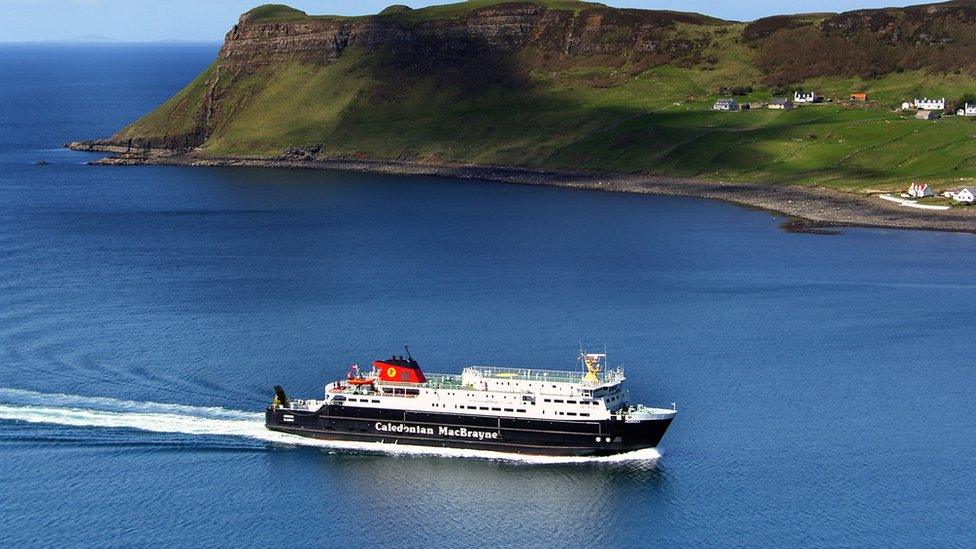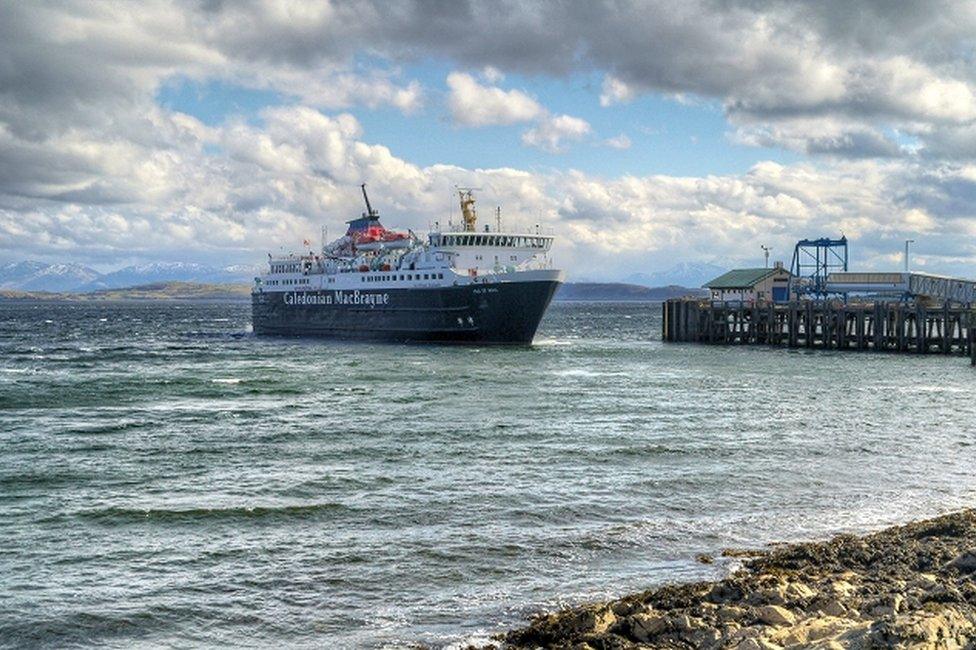CalMac wins £900m ferry contract
- Published

CalMac ferries carried 4.6 million passengers last year
Caledonian MacBrayne has won a new £900m contract to continue operating the Clyde and Hebrides Ferries Network.
State-owned CalMac and private firm Serco Caledonian Ferries Limited had been competing for the contract to run the services.
CalMac already operates the routes on the west coast of Scotland, which include the inner and outer Hebrides.
The new contract, which was awarded by the Scottish government, covers the eight-year period from 1 October.
Serco's bid was deemed to be "non-compliant" by government body Transport Scotland after the firm sought changes to commercial terms aimed at striking a balance between the risks and rewards involved.
The tendering process was the source of a dispute between unions - which wanted the ferry services to remain in public hands - and CalMac and the Scottish government last year.
Independent panel
The Scottish government said EU rules meant it had to open the process to competitive bids.
The dispute saw an independent panel set up to provide examine the tender process, which it found to have been fair, open and transparent.
Serco already runs the NorthLink ferries to Orkney and Shetland.

The services currently operated by Caledonian MacBrayne link the mainland with islands in the Inner and Outer Hebrides
The Scottish government said CalMac had committed to retaining its pension scheme, and to a policy of no compulsory redundancies.
Its bid included 350 commitments to improve the service, including £6m investment in vessel and port improvements.
Among its other pledges are:
The introduction of smart and integrated ticketing systems on key routes
Increasing passenger/vehicle traffic by 10% and commercial traffic by 12% over the course of the contract
Providing more opportunities for local employment, including more apprenticeships
The creation of a new Director of Community and Stakeholder Engagement post and a Communities Board to better involve communities in investment and services decisions
Retaining its head office in Gourock and maintaining its status as a Living Wage employer
All existing routes and services will continue to operate as they do now
CalMac operates 31 vessels, which provide 135,585 sailings every year - an average of 371 sailings a day - to 24 island destinations and 50 ports.
Its ferries carried more than 4.6 million passengers last year, as well as 1.1 million cars, and 87,000 commercial vehicles.
Confirming CalMac as the preferred bidder, First Minister Nicola Sturgeon said the ferry company was "woven into the fabric of the communities they serve".
Ms Sturgeon added: "Their tender offers a good deal for those communities served by these vital transport links and ensures that we can maximise the opportunities to support and nurture our island economies.
"CalMac will better manage demand to drive an increase in traffic, as well as make the ferry services more attractive with the introduction of smart ticketing on key routes."
'Value for money'
She said the contract meant Scottish Ministers would retain control of all of important issues, such as fares and timetables, through the public service contract.
Welcoming the announcement, CalMac managing director Martin Dorchester said: "We are proud to be given the opportunity to transform ferry passengers' experience across the west coast of Scotland and to work closely with our partners to connect towns, cities and communities like never before.
"Our successful bid demonstrates our ability to provide innovative service improvements and value for money for customers."

The RMT Union, Labour and the Greens had organised a rally outside the Scottish Parliament
Scottish Labour, the Scottish Greens and the RMT union had been due to hold a demonstration outside the Scottish Parliament calling on CalMac to be awarded the contract.
The rally was repurposed as a celebration, although MSPs said they would now turn their attention to other ferry contracts due for renewal, including the northern isles ferries.
New transport secretary Humza Yousaf was also in attendance at the Holyrood rally.
RMT general secretary Mick Cash said the award of the contract to CalMac was a "major victory for the union and a successful defence of the principle of public ownership and operation of lifeline Scottish ferry services".
He also said it was a "complete vindication" of the union's industrial action last year, which he said had secured meaningful employment and pension protections.
Labour and the Scottish Greens also said Scottish ministers had made the right decision, but Labour continued to claim that the "costly and time consuming" tender process had not been necessary.
The Scottish Conservatives said the tender process had been designed to deter private companies from bidding and winning, and that a number of questions remained to be answered as to why Serco's bid was ruled out as being non-complaint.
Kevin Craven, chief executive of Serco's UK central government division, said it was disappointed by the decision as it believed it could have made significant improvements to the quality and reliability of ferry services.
But Mr Craven said the improvements promised by CalMac demonstrated the benefits of putting public sector contracts out to competitive tender.